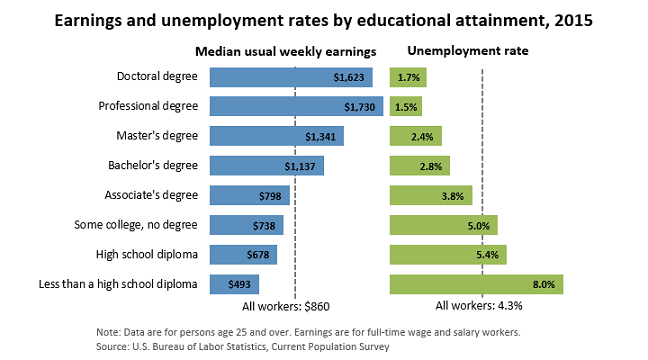The benefits of having a degree or even specialized training over a high school diploma are obvious: persons with some training or college earn over 10% more in median weekly earnings and face a lower unemployment rate (BLS).
As you obtain higher education and degrees, those earning generally increase substantially while unemployment rates drop further. Below, you can learn how degrees benefit CNAs and about the benefits of campus-based programs over their online counterparts or CNA training alone.

Getting a degree provides more than just higher salaries and better job security. A college education can help provide you with skills at a network of friends, teachers, and colleagues that can assist you throughout your career.
Why should I earn a degree?
Becoming a certified nursing assistant does not require obtaining a degree. However, it is practical and, in most cases, efficient to obtain an associate degree in nursing while training as a CNA. More importantly, a degree provides several benefits to CNAs that are unavailable otherwise:
- Opportunity – Obtaining a degree in healthcare or nursing gives you an additional set of skills that you would not obtain though a CNA training program. These skills can often be used for positions outside of and sometimes higher than that of a CNA.
- Advancement – A degree is often a stepping stone for career advancement. Obtaining an associate degree while becoming a CNA removes an obstacle you would have to face down the road, should you decide to further your career.
- Security for the future – While there is no certainty of what changes lay ahead, all fields evolve over time. In fact, nurse practitioners are now often required to obtain a Doctor of Nursing Practice (DNP). In the past, a master of science in nursing (MSN) was sufficient. Getting a degree now may help assure you remain qualified for the jobs of tomorrow.
- Soft skills – As you work towards a degree, you will improve your communication, human interaction, presentation, time management, and teamwork skills. All of these skills are vital and applicable throughout a career in healthcare. Training as a CNA may develop some of these skills, but it does not match the emphasis or impact that a college education provides.
What are the benefits of campus-based programs?
Earning a degree in nursing or healthcare yields several benefits over simply completing your CNA certification, but earning a degree at a campus can produce even more. Online programs remain an excellent choice for working professionals or parents as their flexibility in scheduling and program completion is unrivaled, but earning a degree through a campus-based program can be a great choice for students just starting their careers.
There are numerous advantages, such as:
- Networking – While going to college at a campus, your network of teachers, friends, and even industry professionals can grow. While connections in the healthcare industry aren’t as essential as other professions, they always prove invaluable in the long run, no matter what career you pursue. Being able to work with fellow students on assignments can also be very helpful in your educational career.
- Guided learning – Online classes are great for the self-motivated individual. However, for students who like assignments and lessons fully scheduled and outlined, campus programs can pull ahead.
- Face to face interaction – Professors for online classes are usually just an email away. Sometimes, it is easier and faster to simply raise your hand and ask a question in person though. Also, some material can easier to grasp when explained in person over an online lecture or presentation.
- Location-based resources – One of the best benefits campus-based programs provide is access to additional resources for your education or career. This can be as simple as a library, but many colleges also have an employee dedicated to professional development. This person helps with developing skills like writing resumes and cover letters, but more importantly, they often work with businesses and organizations in the area to help students land internships and even jobs.
- Hands-on learning – Campus programs are great for students who learn best through hands-on activities and assignments. Most online classes use only visual and auditory mediums to convey information.
For your convenience, we have listed several campus programs below for associate degrees in nursing:
- Brown Mackie College: AAS in Nursing
- Fortis Institute: Associate of Nursing
- Fortis College: Associate of Nursing
- Florida Career College: AS in Nursing
- Harrison College: Associate of Nursing
- Keiser University: AS in Nursing
- Southwest Florida College: AS in Nursing

